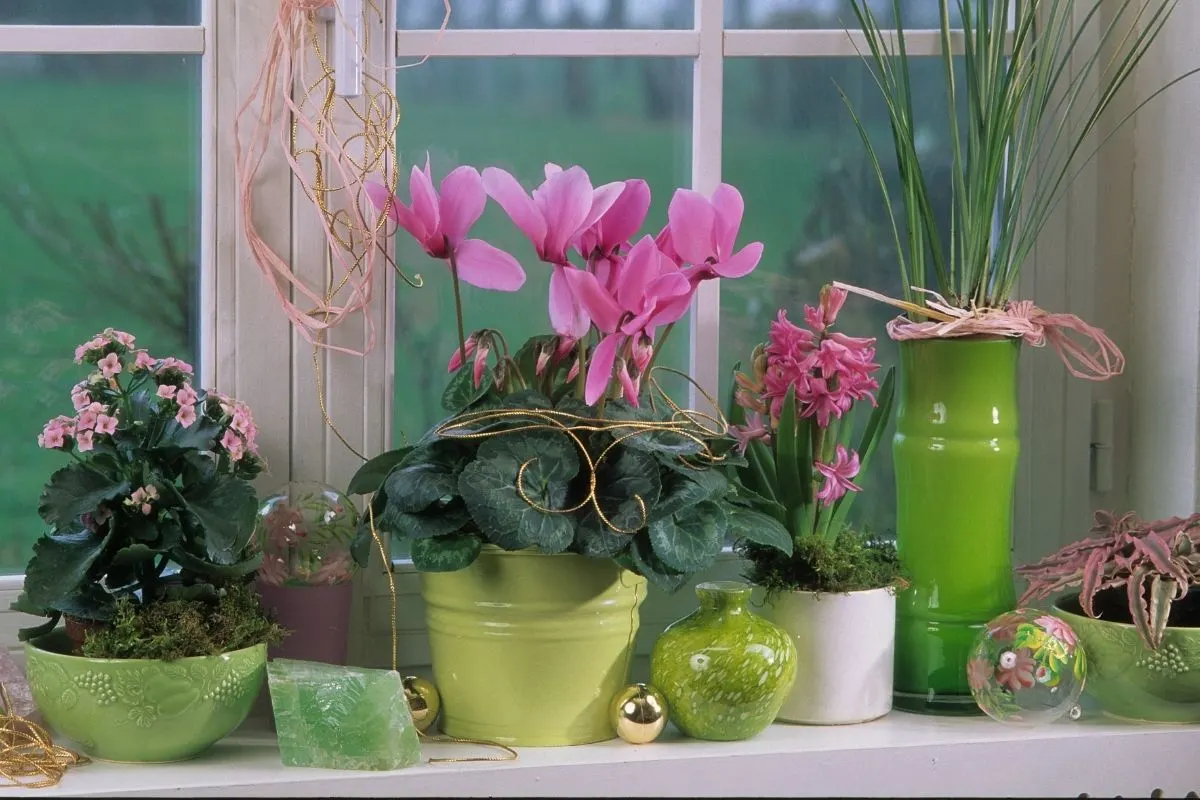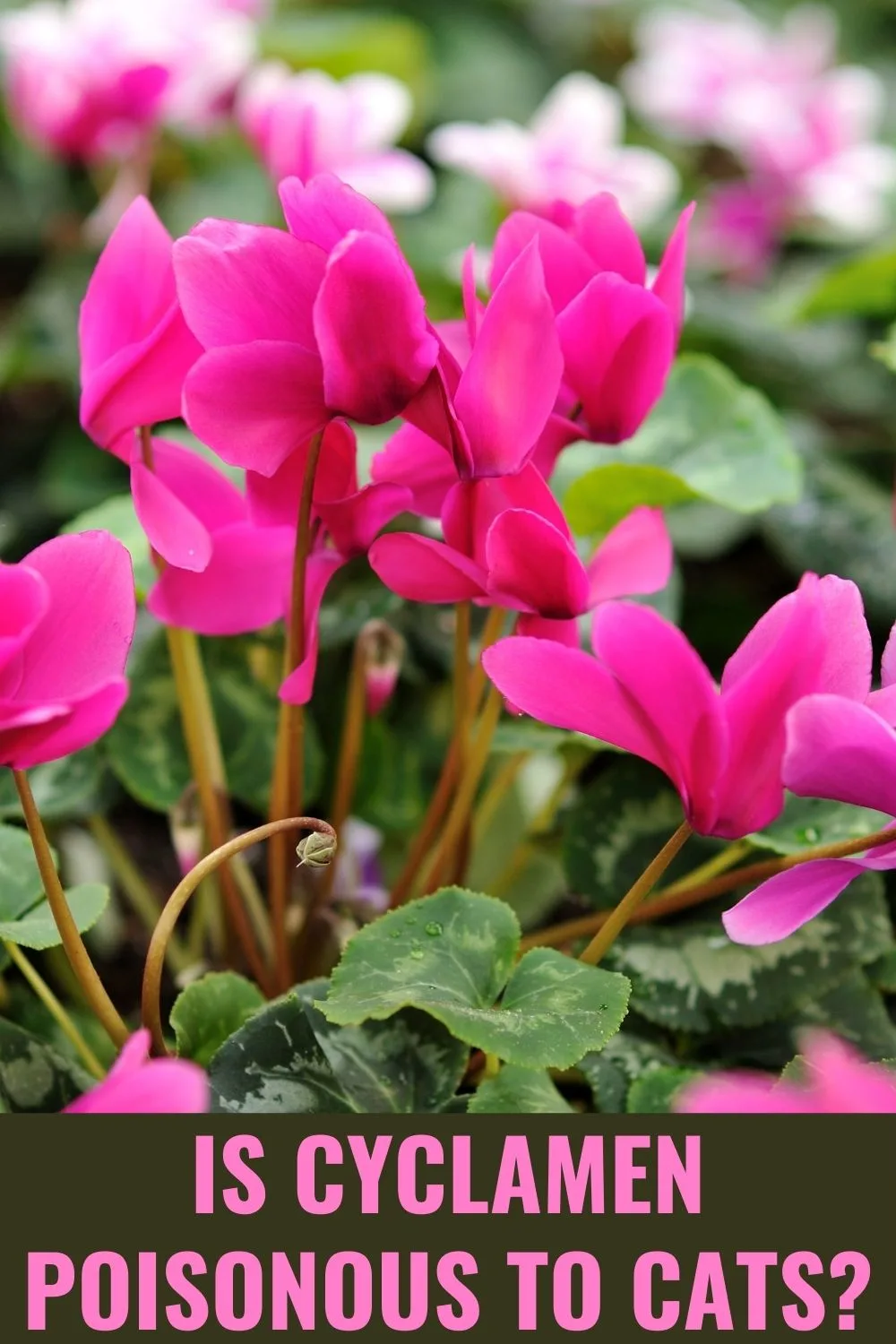If you love plants and cats, then you probably have a lot of questions about which plants are safe for your kitties and which ones should be strictly avoided. There are many toxic plants that are commonly found in and around homes. So, is cyclamen poisonous to cats?
It is! You need to be careful of this plant around your kitties because it can have serious adverse effects. The only way to truly prevent this is to avoid letting your cats have access to it. Let’s deep dive into this and learn more.

What is Cyclamen?
The cyclamen is a flowering plant that belongs to the primrose family. It is native to Europe, Africa, and the Mediterranean region. The cyclamen typically has dark green, heart-shaped leaves and flowers that range in color from white to pink.
It is also known by the common names Sowbread, Florist’s cyclamen, Ivy-leaved cyclamen, and Persian violet.

The plant gets its name from the Greek word for “circle,” which refers to the shape of the flower petals. The cyclamen is a popular houseplant, and it is also often used as an ornamental plant in gardens. The cyclamen is easy to care for and can thrive in both shady and sunny locations.
It is commonly used in outdoor landscaping and can be toxic to small animals like cats and dogs.
If you have a cat and love to fill your home with houseplants, reading Don’t Feed Me to Your Cat!: A Guide to Poisonous Houseplants is a must!
Is Cyclamen Poisonous to Cats?
Cyclamen is a beautiful flowering plant that is often found in gardens or as a houseplant. However, cyclamen is also poisonous to cats. Cyclamens contain terpenoid saponins, which is the toxic component. The toxic compounds in cyclamen can cause vomiting, diarrhea, and heart arrhythmias in cats, just to name a few potential symptoms.
If your cat ingests cyclamen, it is important to seek veterinary care immediately. Symptoms of cyclamen poisoning can start within hours of ingestion and may last for several days.
With prompt treatment, most cats recover from cyclamen poisoning without any lasting effects. However, if left untreated, cyclamen poisoning can be fatal. Therefore, it is important to be aware of the dangers of this plant if you have a cat in your home.
Which parts of cyclamen are toxic?
All parts of the plant contain cyclamin, a toxic substance that can cause stomach pain, vomiting, and diarrhea if ingested. In severe cases, cyclamen poisoning can lead to seizures and even death.
The leaves, flowers, stems, and tubers are all toxic, but the tubers are the most toxic.
Clinical Signs of Cyclamen Poisoning
It’s also important to know what to look for in case your cat does eat some of this plant. Remember, however, that cats don’t always show their distress. If you witnessed your cat eat cyclamen, seek treatment from a vet even if you don’t see any outward signs of poisoning.
Some signs of cyclamen poisoning in cats include:
- Loss of appetite
- Oral irritation
- Drooling
- Abdominal pain
- Acute kidney failure
- Liver failure / severe liver damage
- Death (in severe cases)
The most common symptom is vomiting, which can occur within hours of ingestion. Other symptoms may include diarrhea, lack of appetite, and abdominal pain. Symptoms of poisoning can vary from cat to cat, and also based on how much they ingest. Cats are also very good at hiding their pain so you can’t always go by what you see.
In more severe cases, cyclamen poisoning can lead to tremors, seizures, and even death. If you suspect that your cat has ingested cyclamen, it is important to seek veterinary attention immediately. Early diagnosis and treatment are essential for a favorable outcome.
Treatment of cyclamen poisoning in cats
Your vet will know how to spot the clinical signs of plant poisoning and will also know the best treatments to give. Sometimes your cat will need to stay overnight, but other times, he might be released the same day for you to monitor at home.
If you suspect your cat has eaten cyclamen, it’s important to seek veterinary help immediately. Treatment of cyclamen poisoning typically involves induced vomiting and administration of activated charcoal to absorb the toxins. Sometimes medications will be subscribed to help your cat get better faster.
With prompt treatment, most cats make a full recovery from cyclamen poisoning. However, it’s important to be vigilant in keeping cyclamen out of reach of curious cats. When it comes to your pet’s health, it’s better to be safe than sorry.
Prevention of cyclamen poisoning in cats
The best prevention is to not bring these plants into your home at all. There’s no other way to be 100% certain your cat does not come into contact with it.
Conclusion
Cyclamen are popular houseplants and are sometimes found in floral bouquets that are sent for holidays. If you have cats, it’s very important that you avoid bringing these into your home at all. That’s the only way to be sure they cannot ingest it. Indoors is always the safest place for your kitty, but if your cat also goes outside, then you have to be sure there isn’t any on your property that she can eat.
As cat owners, we have an obligation to keep our feline friends safe. This includes not bringing any common houseplants in without first checking to see if they are dangerous.

